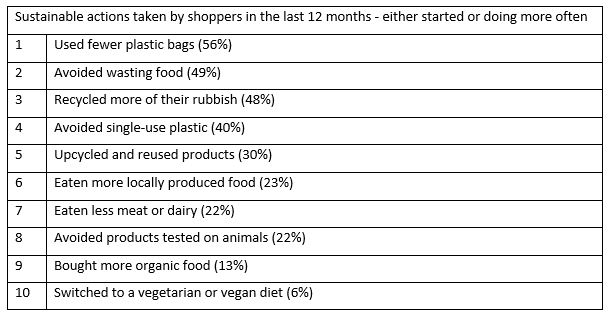Almost two thirds of Brits (equivalent to 32.2m people) now consider themselves ‘ethical or sustainable grocery shoppers’, and 36% say ethical or sustainable considerations are the most important factor in their grocery shopping.
Research of over 2,000 UK grocery shoppers by natural food company Wessanen UK – best known for its brands Clipper Teas, Kallo, Whole Earth and Mrs Crimble’s – found that:
· 44% of Brits say they ‘always’ or ‘often’ look to buy ethically and/or sustainably produced groceries
· 37% say they have been considering ethical and sustainability issues more often when grocery shopping over the last 12 months
· 34% say they would be willing to pay more for products which are certified ethical – the same proportion who would pay more for products which use less plastic and packaging
· Over a third of shoppers (39%) said a price premium for ethical and sustainable groceries of up to 10% was fair
· 56% of shoppers are using fewer plastic bags and 40% are avoiding single use plastic compared to a year ago
· The Co-Op ranked highest as the supermarket that helps Brits live ethically and sustainably, closely followed by Tesco, Waitrose, Sainsbury’s and M&S
· Fairtrade is the most recognised ethical label, with 62% claiming to actively look for this logo when grocery shopping
Shows like the BBC’s Blue Planet have prompted over a third (37%) of respondents to think more sustainably, and concern for the environment is now a driver for conscious purchasing for over a half of consumers (54%). The other key reasons cited for buying sustainable or ethical groceries include being ‘the right thing to do’ (48%) and buying products because they are produced more honestly and fairly (48%).
Despite 60% of Brits self-identifying as ‘ethical or sustainable shoppers’, the research found that price is still a barrier for many, with 76% of respondents overall citing ‘low prices and good value’ as the most important considerations when buying groceries – still more than double the 36% for whom the impact on the planet is the most important factor.
It’s really encouraging to see positive ethical shopping intentions and wider sustainable behaviours are on the increase, although people’s desire to do good is still often superseded by their desire to save money. As a B-Corp certified company, we believe in doing business in a way that’s best for the world, and it’s our mission to help more consumers understand why it’s worth paying a little more for sustainable and ethical goods if they can afford to. Small changes to shopping habits can make a huge difference to both the planet and the lives of people around the world working to produce food more responsibly.
The research also explored factors that would persuade shoppers to buy ethical or sustainable products more often. 35% said clearer labelling would help, 47% felt wider availability would make a difference, and just over half (52%) said that price parity with non-sustainable or non-ethical goods would sway them. Indeed 39% of shoppers felt that ethical and sustainable products should be the same price as ‘normal’ products, though another 39% said a price premium of up to 10% was fair.
In these tough economic times, it’s natural that price is a key consideration for many grocery shoppers, says Vass. But it’s worth remembering that lower costs at the till can often mean higher costs to the environment. We’re determined to reframe the way people think about value when grocery shopping – away from just price, and towards a wider appreciation of the priceless value of ethical and sustainable food production to our world.Emma Vass, CEO at Wessanen UK
Wessanen UK’s ‘Sustainable and Ethical Grocery Shopping’ report was conducted by Profundo Insight between 16-25th August 2019 amongst 2,146 nationally representative UK adults





